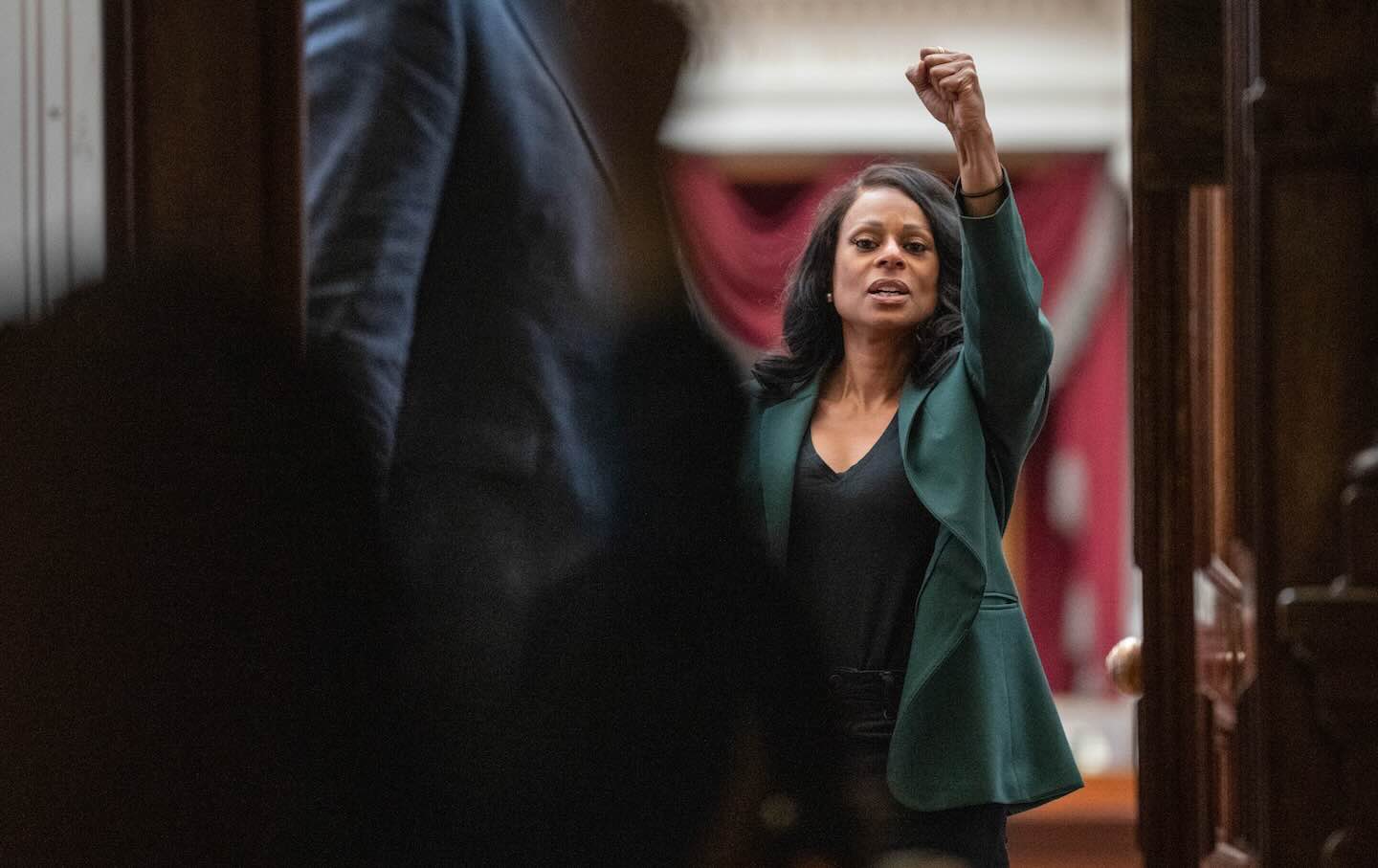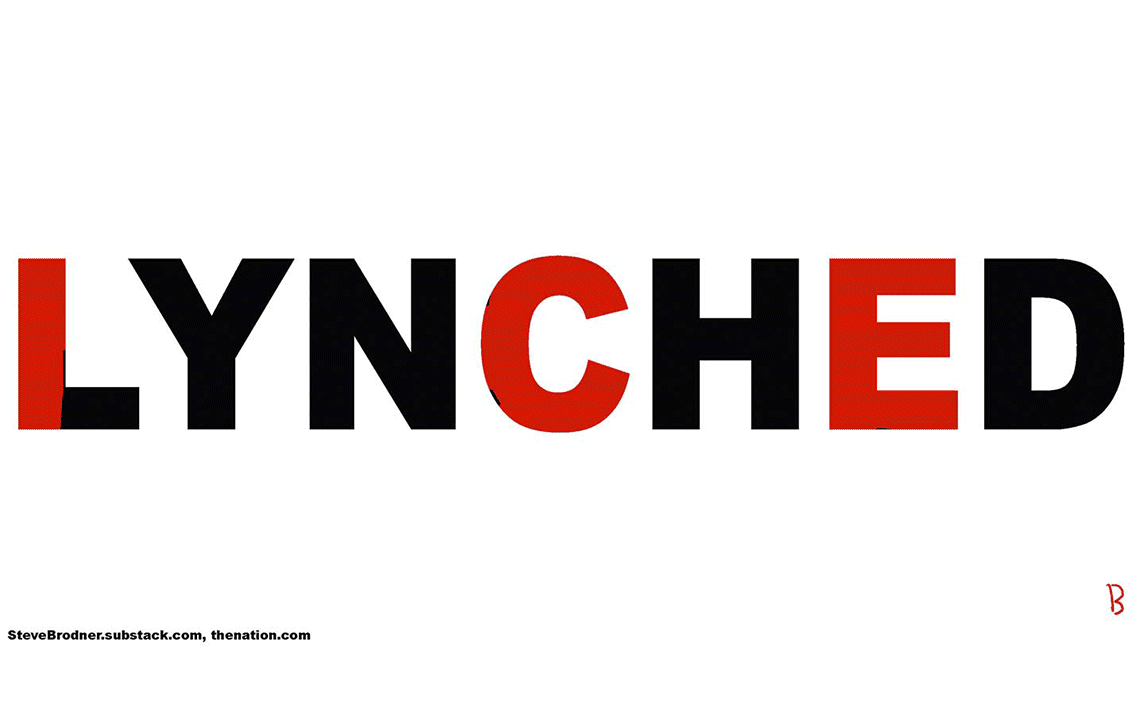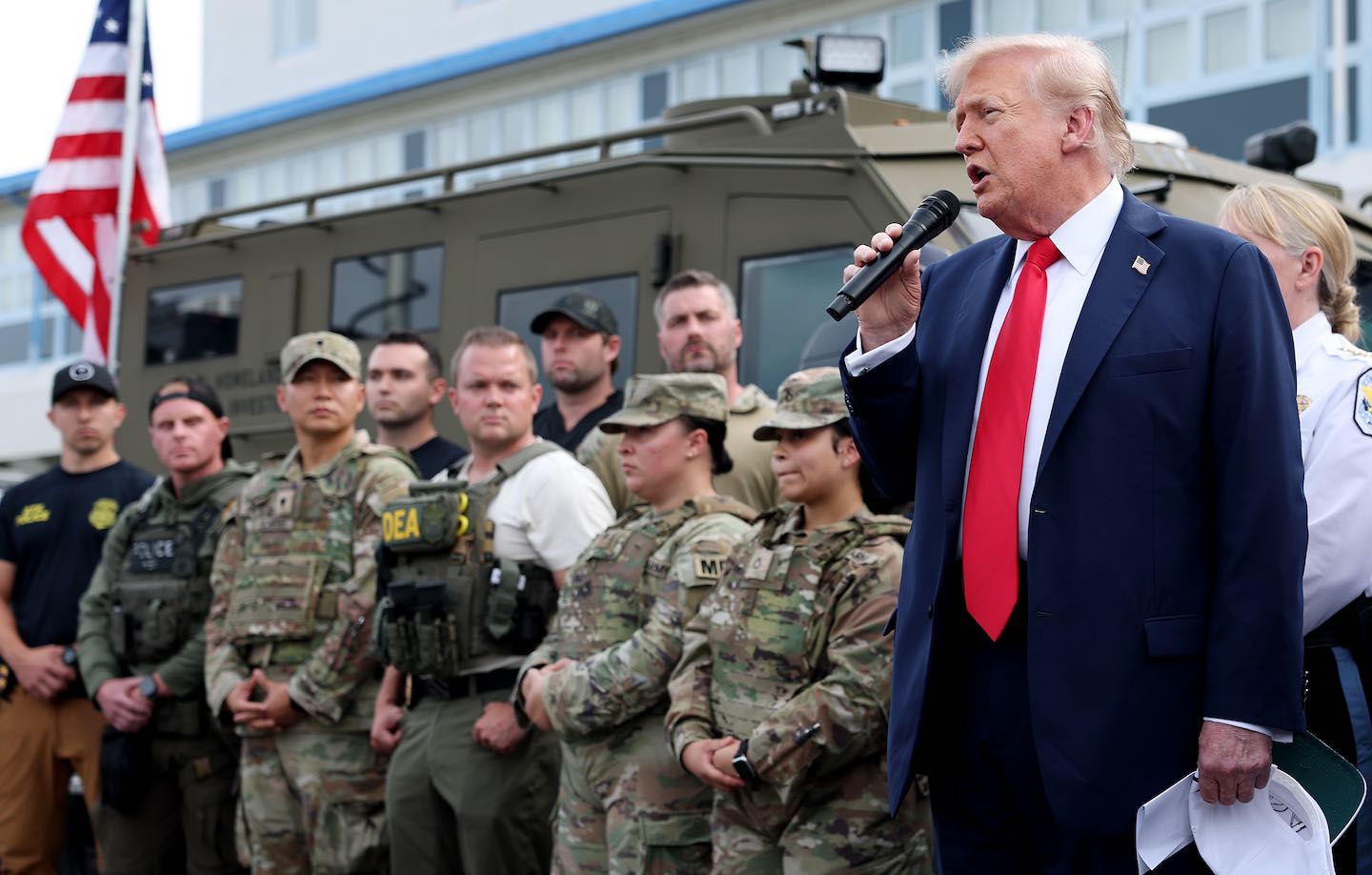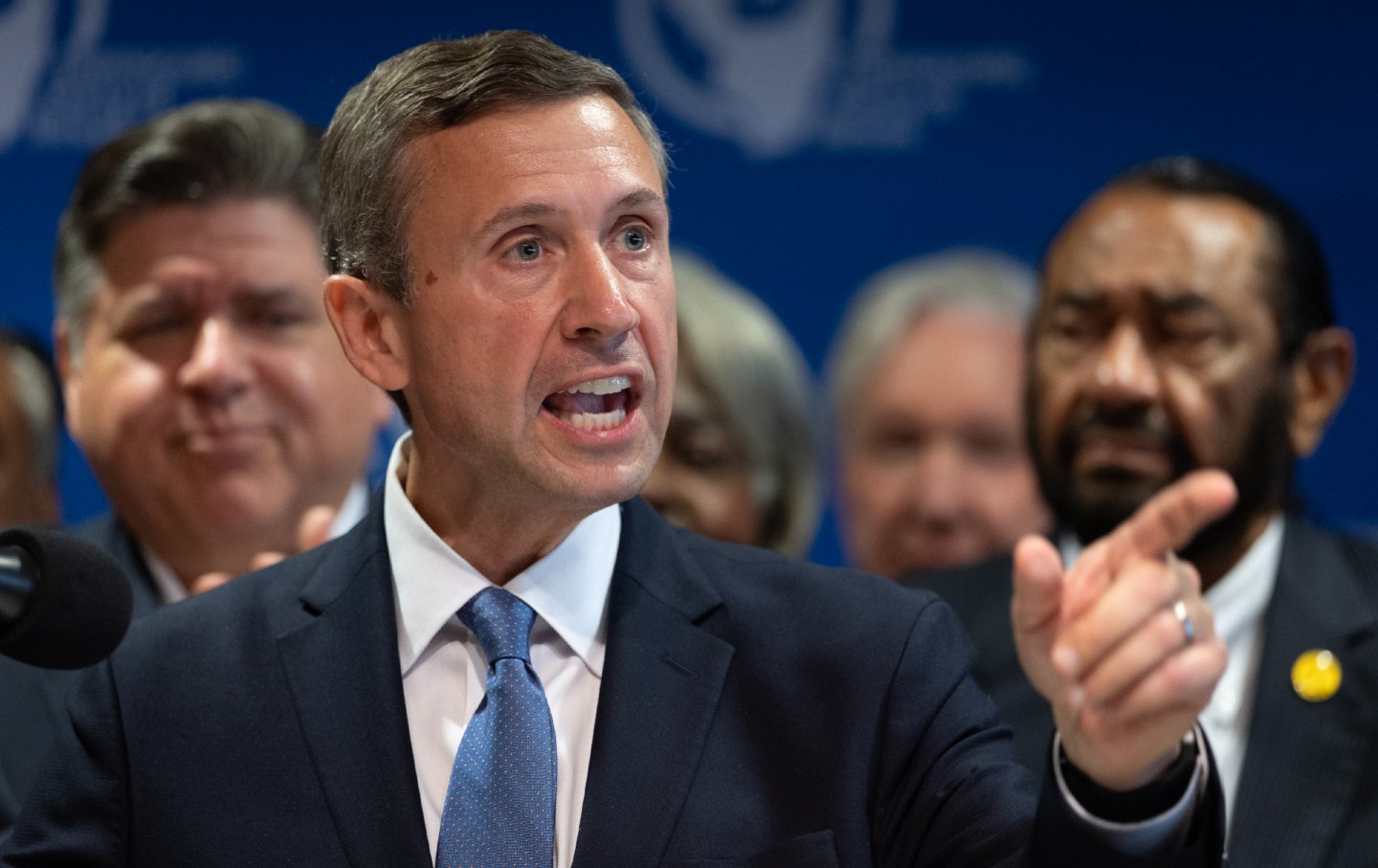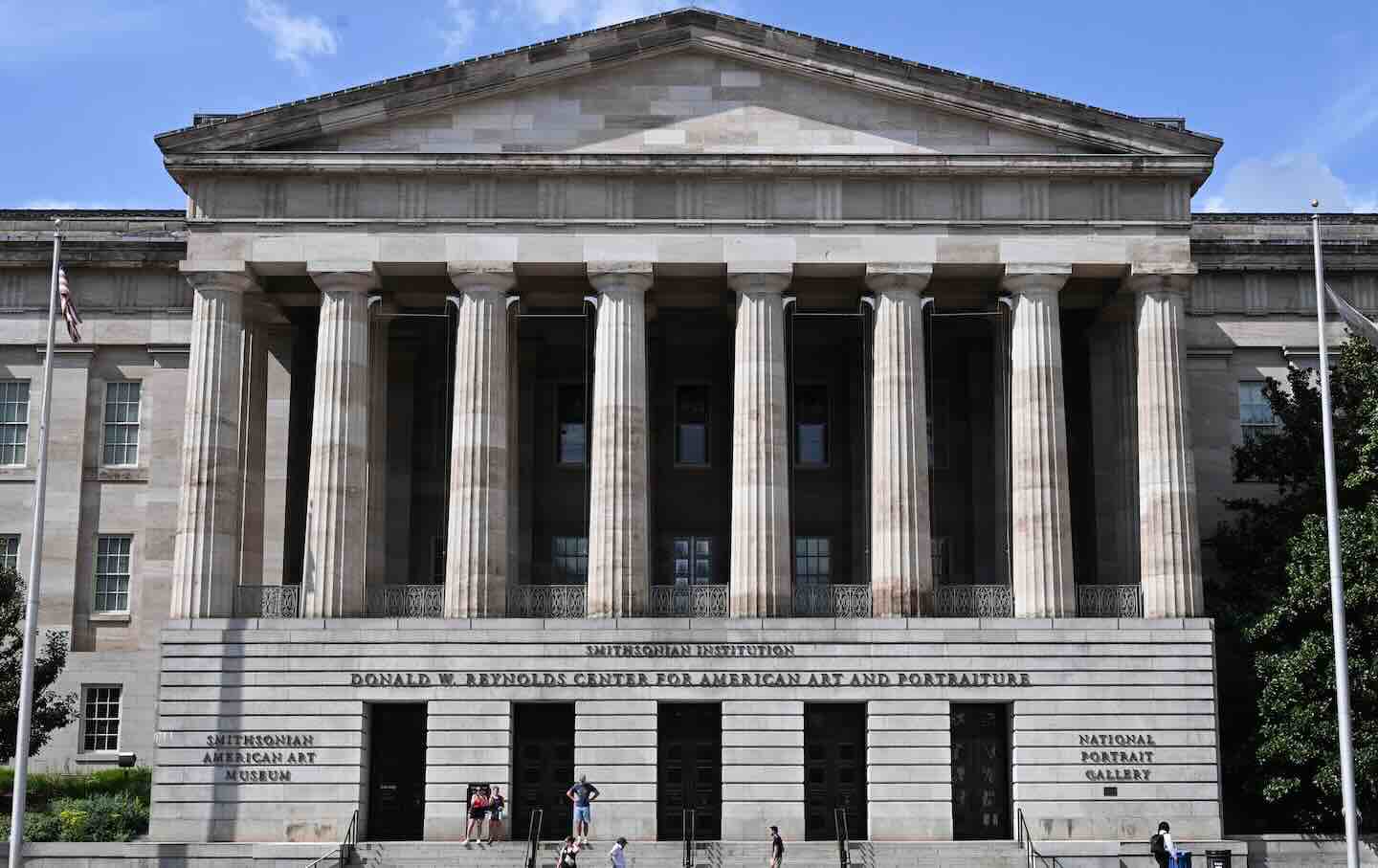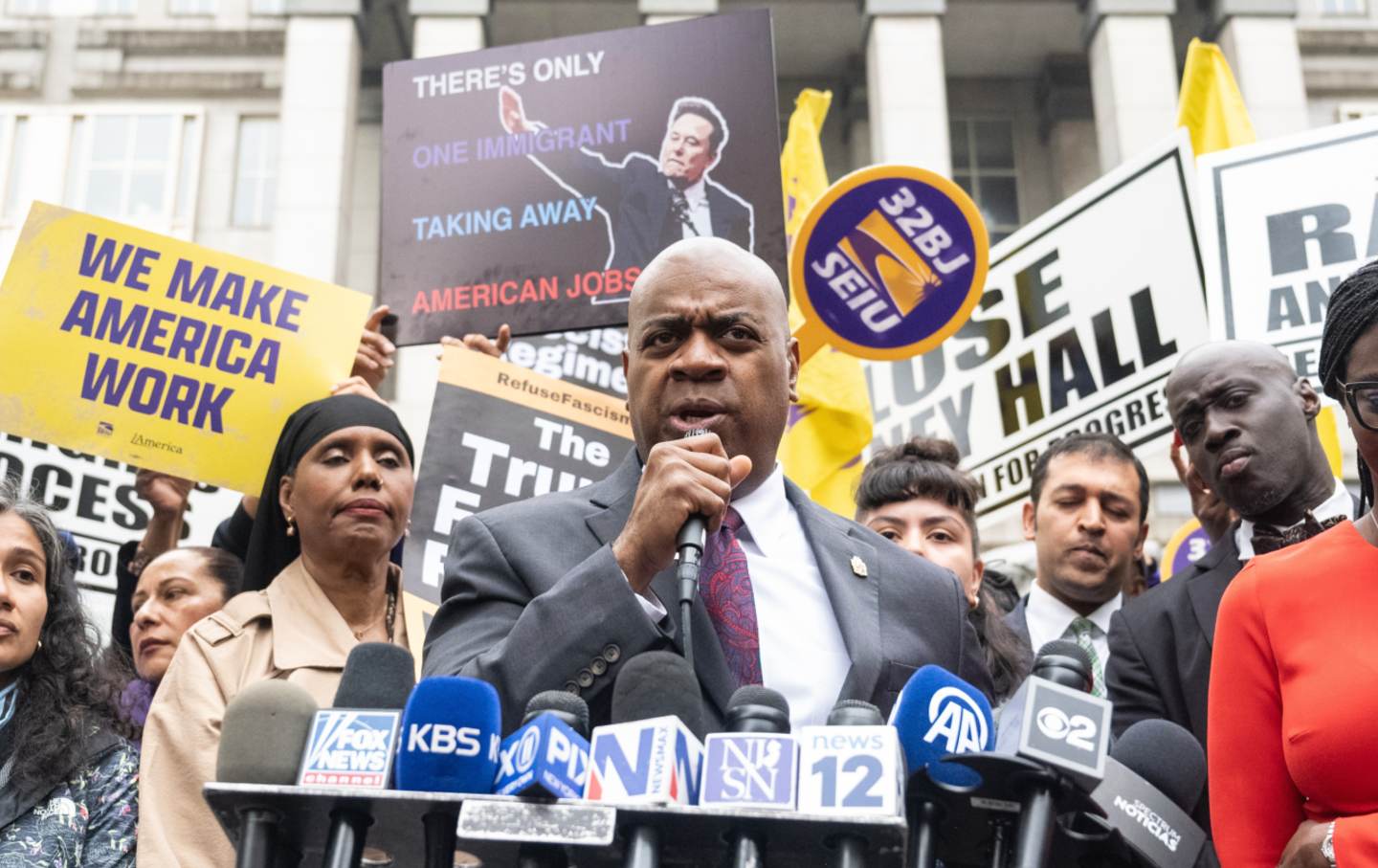
Ras Baraka, the mayor of Newark, speaks to the media and supporters after exiting the courthouse on May 15, 2025, in Newark, New Jersey. Baraka appeared in federal court for a status conference on the Trump administration’s charge that he trespassed last week at Delaney Hall, an ICE immigration detention center.
(Stephanie Keith / Getty Images)The battle for immigration rights is playing out in US cities, where new private immigration detention centers are taking root. From Newark, New Jersey, Ras Baraka is among the voices of resistance. There at the new Delaney Hall detention facility, the mayor of New Jersey’s largest city and a front-runner in the gubernatorial race, was protesting the Republicans’ immigration agenda when he was arrested by ICE agents and detained for hours. His charges were dropped, but Baraka is not backing down. On June 3, he announced a lawsuit against the interim US attorney for New Jersey Alina Habba and DHS Agent Ricky Patel, for false arrest, malicious prosecution, and defamation. I spoke with Baraka to find out what’s happened in the weeks since his arrest, and why cities like Newark are being targeted by the Trump administration. And in the race for governor, what are his priorities and his strategy for surviving federal funding cuts? If elected, he would be the first Black governor in New Jersey and only the fourth Black governor in the country. If he’s not elected, he is still a politician to watch as he insists on advancing forward-thinking policy, even in these tough times.
—Laura Flanders
Laura Flanders: Let’s start with that confrontation at the Delaney Hall facility in Newark. What’s the status of the facility? Who’s in there? And what was your concern about the place?
Ras Baraka: It’s a private prison. The government has a contract to house some of their detainees there, so they don’t own the property. They don’t have a lease on the property. We wanted them to allow our inspectors to inspect the property and to apply for a certificate of occupancy. They don’t have one. But they decided to put people in the property, whether they’re detainees or workers or anybody who shouldn’t be there, without a certificate of occupancy. We took umbrage with that, and we were in court. Our congresspeople decided to go there. I came for a press event, and it escalated into them arresting me. Thank God that those charges have been dismissed, but we still have charges on the congresswoman LaMonica McIver that we’re trying to get dismissed as we speak.
LF: How do you see your arrest and the indictment of your colleague LaMonica McIver within the broader context of what’s happening in this country?
RB: We’re moving very fast towards authoritarianism if we haven’t arrived there already. You’re talking about people who are arresting mayors, judges, congresspeople, anybody who they think is going to defy them. Deporting people with green cards and visas simply because they have different ideologies. Running up on people who are, in fact, citizens. Who are violating people’s due process. These folks passed congressional legislation in the House with a caveat to stop federal courts from putting injunctions on their executive orders, or whatever else they think they should do that’s outside of the Constitution. It’s dangerous, and we should be very concerned.
LF: Do you think you were targeted personally? Because the video sure looks that way.
RB: Absolutely. I was in the facility for over an hour and a half, just standing there, and they came and targeted me. They targeted me, because I’m the mayor of the city. They targeted me, because I’m up there trying to hold GEO accountable to city laws.
LF: GEO, the for-profit company that runs the place that got the contract.
RB: That’s right. So, yeah, they targeted me. They came after me. When I left the facility, they continued to come after me and had me arrested anyway.
LF: I saw you quoted somewhere saying, giving up on the sanctuary city status of Newark would be like giving up on democracy. How so?
RB: Immigration is a key component to this country. We have advertised to the rest of the world that we’ve discovered the best thing since sliced bread. That we should be the envy of the entire world because we have this democracy and our Constitution defends that. Why don’t you think people are going to come here and try it on and see how it fits? To renege on that promise makes us a different place than what we taught our kids.
LF: Now you, like so many Democratic-run cities, are facing serious onslaught from Republican policy coming down from Washington, cutbacks and health cuts and you name it. Describe Newark for people that don’t know it.
RB: Newark is the state’s largest city. It is a working-class town, average income of about $37,000. It’s always been an immigrant community, and that’s been a strength of this city. We have done tremendous things in this town. Changing the skyline, forcing affordable housing. Reduced violent crime by 61 percent, diminished street homelessness. Did guaranteed income. Hundreds of families benefited from this, as a part of the larger Mayors for Guaranteed Income. We’ve expanded broadband, put it in every public park in the city, every recreational center, and we have given it to folks in our community for as low as $20.
LF: How do you deal with this moment where it feels like so much that you’ve gained is at risk? At risk of large-scale deductions in funds coming from the federal government, that will leave cities like yours carrying the can.
RB: It is at risk. All the programs, from Community Development Block Grant dollars, housing dollars, Medicaid opportunities, SNAP. Folks will be homeless without vouchers. So it’ll have a devastating impact on Newark and many communities like that. That’s why we need the states to step up. We need people to push back against what’s happening through the judicial system. But we also need to be creative. What we need to be doing now is figuring out how we have a Medicaid system that’s separated from what the federal government is doing.
LF: You have a lot of competitors in the primary election. How do you distinguish yourself from the others?
RB: I think it’s pretty clear when you hear us talk at debates. What I’m trying to do is a lot bigger, a lot more imaginative, a lot more creative. People say it’s too progressive. I think that making the rich pay a fair share is not too progressive. I think that creating statewide rent control and building affordable housing is not too progressive, or talking about a public option, that exists in many countries around the world who have full public healthcare, is not too radical or too progressive. I think these are issues that people are waiting for us to talk about. Courage and leadership is probably more important than anything else, because Maya Angelou said that courage is the most important value, because it gets you the opportunity to practice all the other ones.
LF: I need to ask you what I’ve heard from some people, which is, was your positioning there at the Delaney Hall facility to stand out amongst that pack there running for governor?
RB: I think that’s ridiculous. What people are forgetting to understand is I’ve been there. I was there every single morning before that arrest, at 7 am with fire inspectors, trying to gain entry with the ICE agents right there. If I wanted to grandstand I could, but that was not my goal. I went down there to a press conference at 1:30 pm with the congresspeople, and the folks from Homeland Security are the ones that escalated, not us. If you see the video, I walked in because they asked me to come in and then began to try to accost me and do all these other kinds of things. It was completely avoidable and totally unnecessary.
LF: I heard you on national television calling on other members of the national congressional and senatorial delegations, but certainly the ones from New Jersey to show up. Have they?
RB: We got a lot of calls, a lot of well wishes. A lot of people have said a few things, but I don’t think there’s any collective action. That’s what’s missing. As I go up and down the state of New Jersey, people are very afraid, and they’re saying that we need leadership. I think there’s a lot of people that are exhibiting leadership. I don’t think people feel it because there’s no collective thing happening. There’s no collaboration going on. Nobody’s planning anything. It’s all spontaneous and individualized, and there’s no real strategy on how we push back against these people nationally.
LF: Where do you draw your strength from? And what’s your message to folks out there who are perhaps feeling a little rootless
RB: I tell people I’m afraid too, but I pray that fear doesn’t turn me into a coward. And the reality is we can’t be the only generation that does not sacrifice opposition, our proximity to influence, our privilege, our power for the generations that come after us. Many people sat in jails, lost their lives in order for us to enjoy the kind of democracy we have today, that is being taken away from us little by little.
Take a stand against Trump and support The Nation!
In this moment of crisis, we need a unified, progressive opposition to Donald Trump.
We’re starting to see one take shape in the streets and at ballot boxes across the country: from New York City mayoral candidate Zohran Mamdani’s campaign focused on affordability, to communities protecting their neighbors from ICE, to the senators opposing arms shipments to Israel.
The Democratic Party has an urgent choice to make: Will it embrace a politics that is principled and popular, or will it continue to insist on losing elections with the out-of-touch elites and consultants that got us here?
At The Nation, we know which side we’re on. Every day, we make the case for a more democratic and equal world by championing progressive leaders, lifting up movements fighting for justice, and exposing the oligarchs and corporations profiting at the expense of us all. Our independent journalism informs and empowers progressives across the country and helps bring this politics to new readers ready to join the fight.
We need your help to continue this work. Will you donate to support The Nation’s independent journalism? Every contribution goes to our award-winning reporting, analysis, and commentary.
Thank you for helping us take on Trump and build the just society we know is possible.
Sincerely,
Bhaskar Sunkara
President, The Nation

